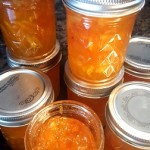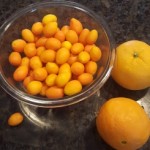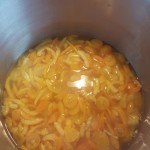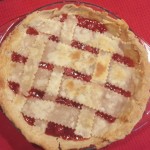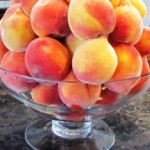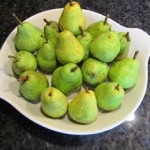How to Make Kumquat Marmalade
Eating a fresh kumquat–the small relative to the sweet orange–is like getting a dose of Vitamin C in a single bite. Or, if you don’t like the tart fruit (the edible rind is sweet), then make your kumquats into a marmalade.
My neighbor recently brought over several boxes of freshly-picked kumquats. We ate some fresh but I turned the rest into a sweet, spread that tastes quite like orange marmalade.
When fruit is available during the year, you can turn that fruit into a delicious conserve, jelly jam, marmalade, or fruit butter. When citrus is in season, oranges, kumquats, grapefruits, and lemons can be coverted to sweet spreads.
There are distinct differences between conserve, jam, jelly, marmalade, and fruit butter. Conserve is a jam made from fruit with other ingredients added, including raisins, coconut, and nuts. Jelly is made from the juice of the fruit while jam is made from the fruit pulp. Marmalade includes fruit, juice, and rind. A fruit butter utilizes the fruit pulp and sugar to make a thick, smooth spread.
KUMQUAT MARMALADE RECIPE
Ingredients:
2 cups thinly sliced kumquats
1.5 cups chopped orange pulp (2 medium oranges)
1.5 cups sliced orange peel (2 medium oranges)
1/3 cup lemon juice
1.5 quarts water
Sugar (the amount will depend on the amount of fruit/water mixture after 12 hours)
Directions:
Mix together all ingredients, except the sugar, in a deep large pot. Simmer for 5 minutes. Remove from heat and cover. In a cool place, allow the mixture to stand for 12 hours or overnight to soften the rind. Remove any large seeds. Cook rapidly until peel has softened. Measure out fruit and liquid mixture and then add 1 cup of sugar for each cup of the fruit mixture. Stir until the sugar is dissolved.
Rapidly bring the mixture to a boil over high heat. Stir as needed to prevent sticking, especially as the mixture thickens and reaches the gelling point. (Hint: You can check to see if the marmalade is gelling by dropping a spoonful of the hot marmalade onto a chilled or frozen saucer. If the marmalade is sheeting instead of running off the plate, it’s ready to can. Also, you can add Classic Pectin according to directions on container to ensure the marmalade properly thickens). Stir in carefully to avoid splattering on your skin. Remove from heat. If the mixture has foam, skim to remove it. And also remove any large seeds that may have been missed.
Ladle the hot fruit mixture into hot jars (run the jars through a hot rinse cycle as the jam is cooking). Leave 1/4-inch headspace. Tighten the ring around the flat, rubber-seal cap. Place the jars into a boiling-water canner. Bring to a boil and process 10 minutes. Remove jars from canner and let stand until cool. The caps will make a popping sound as they cool and seal.
__________________________________________________________________

- All of Meera Lester’s Henny Penny Farmette mysteries are available online and in bookstores everywhere. Also, check out Meera Lester’s self-help books on health, wellness, and spirituality on Amazon.com See: https://www.amazon.com/Meera-Lester/e/B001JP835E
Swimming in Fruit
Our cherry trees became so heavily laden with fruit this year I couldn’t work fast enough to make the fruit into cookies and pies and jars of jam, conserve, and chutney.
What fruit the birds and squirrels didn’t devour ended up drying on the trees and looking like ornaments. I’m heartened that at least the wildlife will have something to forage on through fall and winter.
The apricot trees did a massive drop of their fruit and seemingly all at once. I made more jam than we’ll probably eat, dried some, and gave away more than a few full buckets of cots to neighbors and friends. I also had to do a messy cleanup of fruit on the ground.
In the cycle now are the summer peaches; so, here I go again . . swimming in fruit.
Next year, I’m going to get my act together early with teams of backyard pickers who can help me remove the fruit, divide it, and distribute it. Right now, however, I’ve got peaches to pick and preserve. The summer pears and figs will be next.
I’m not complaining; I’m enthralled that all this bounty is due to the work of our industrious little honeybees. All this fruit and I haven’t even mentioned finding time to harvest honey. Yet, the bees don’t stop, so neither will I.
________________________________________________________________
If you enjoy reading about farmette topics like keeping bees and chickens, caring for an orchard, or growing heirloom herbs and vegetables, check out my mystery series from Kensington Publishing (due out September 26, 2017).
These novels feature a whodunnit for you to solve and are filled with farming facts, trivia, and delicious recipes. The novels and my other books are available in traditional and online bookstores everywhere. See, http://tinyurl.com/yb42zd2d
 Facebook
Facebook Goodreads
Goodreads LinkedIn
LinkedIn Meera Lester
Meera Lester Twitter
Twitter




